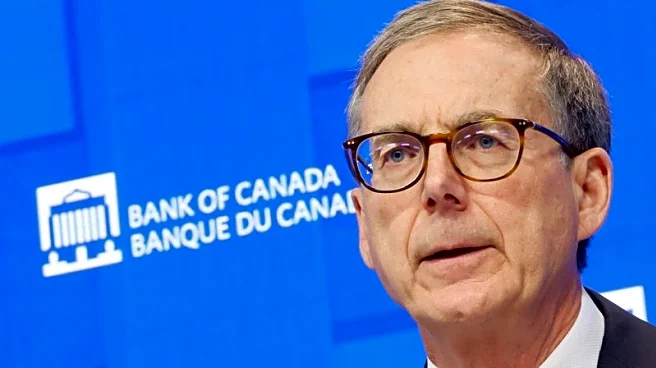By Promit Mukherjee and David Ljunggren
OTTAWA (Reuters) -The Bank of Canada will be putting more emphasis on potential risks when it decides what to do about interest rates later this month even as it tries
to be more forward-looking, Governor Tiff Macklem said on Friday.
"We will need to be humble about our forecasts, and we will continue to put a lot of emphasis on the risks," Macklem told reporters on a conference call from Washington.
The central bank is due to release the rate decision and its latest economic forecasts on October 29 when it will also resume issuing forecasts for the economy and inflation, a practice it discontinued earlier this year citing heightened uncertainty due to a constant threat of tariffs.
"We will be using a new base case projection to look forward against the background of heightened uncertainty ... I'm hoping we can be a bit more forward looking," Macklem said.
He added that there was still a lot of uncertainty even though it lower than the levels seen in February and March.
Money markets forecast that a roughly 64% chance of a 25 basis point rate cut later this month which will bring down the benchmark policy rate to 2.25%. The bank had cut rates last month by 25 basis points to 2.5%.
Before the next rates decision, the BoC will have the benefit of a business and consumer survey which will give insights into inflation expectations, investments and spending. This survey is scheduled for Monday. It will also get the latest inflation report on Tuesday which will show where consumer prices were in September.
The BoC expects GDP growth to resume after a contraction of 1.6% on an annualized basis in the second quarter, Macklem said, but he expects it to still be soft and below potential growth which will not be enough to close the output gap.
Macklem was in Washington to participate in the meetings of the financial leaders of the G7 and meetings of the International Monetary Fund.
He said the leaders at the IMF agreed global imbalances were widening again and could potentially heighten risks, worsen trade tensions and threaten financial stability.
"I'm pleased that the IMF is enhancing surveillance of imbalances," he said.
(Editing by Nick Zieminski)









